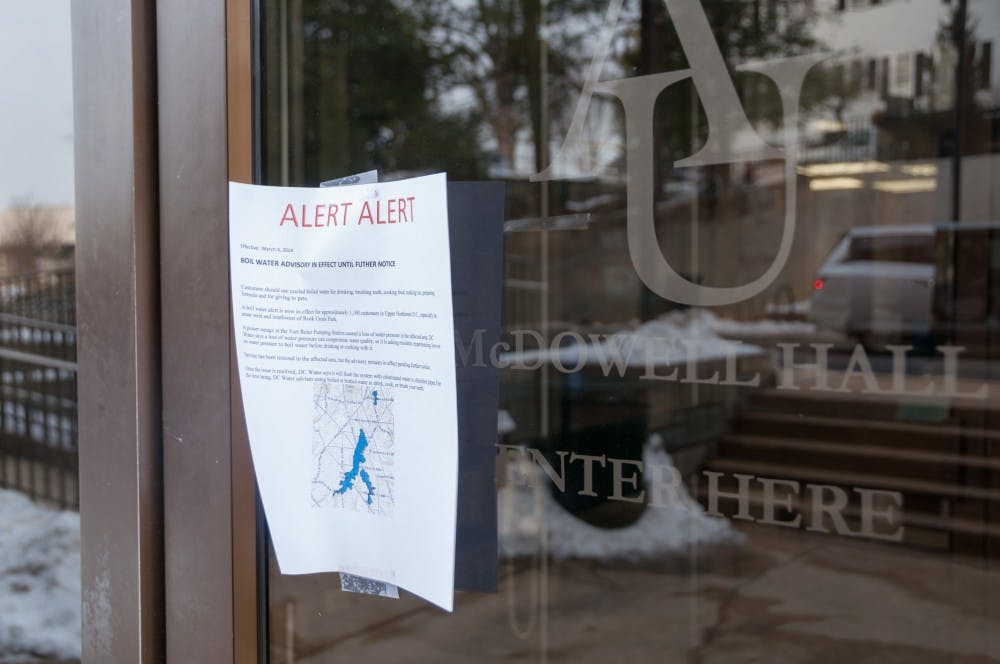The water delivered to parts of Northwest D.C. was declared safe to drink at 11:30 a.m. March 7, according to the D.C. Water and Sewer Authority. This lifted the March 5 boil-water advisory that affected more than 1,000 nearby homes and businesses, including AU.
The water management service tested the water at several sites and at multiple times to ensure that all affected areas were now safe, according to a D.C. Water press release.
D.C. Water advised residents at AU on March 5 to boil water before use due to a power outage at the Ft. Reno pumping station. Ft. Reno is located one and a half miles from the AU campus. The reason for the power outage has not yet been reported.
The areas affected are all uphill of the Ft. Reno pumping station, causing those areas to lose water pressure when the station lost power March 5. D.C. Water was not able to send bacterial disinfectant to parts of Northwest D.C., creating concerns of chloroform contamination in the pipes, even when normal water pressure returned, Nicole Condon, D.C. Water’s water communications coordinator said.
Condon said the boundaries of the potential affected area were “conservative” to ensure the safety of anyone living in potentially impacted areas.
Ingesting chloroform can lead to gastrointestinal issues, including vomiting and diarrhea, Condon said. It was safe to shower as long as the water was not ingested, according to D.C. Water.
University buys water for campus
AU responded to the advisory by distributing 5,900 water bottles, more than 830 gallons, to students, Camille Lepre, assistant vice president of communications, said in an email to The Eagle.
The supplies arrived the morning of March 6, and residence hall staff distributed the water to on-campus residents, Vice President of Communication Terry Flannery said in an email to the AU community.
AU gave out three water bottles to each main campus resident, Flannery said. AU also sent more bottled water to the Eagle’s Nest and the Campus Store.
Some on-campus eateries closed March 6 due to the advisory, including
● Freshii
● Global Fresh
● The Davenport Coffee Lounge
● Starbucks
These food locations served food, but did not offer fountain beverages or coffee:
● Elevation Burger,
● Subway and
● Einstein Bagel Bros.
Elevation Burger provided canned soda or a bottle of water to any customer who bought a meal.
Megabytes didn’t sell any coffee or non-bottled water products, owner Tom Gera said. Megabytes was getting ice from outside sources, he said.
Nobody reported illnesses related to the water advisory to AU, according to Flannery.
“D.C. Water assures us that there is no contamination of the system,” Flannery said in a memo to the AU community March 6. “This water advisory is a necessary health and safety precaution. We are taking steps to provide campus residents with drinking water and to advise faculty, staff, non-resident students and visitors what precautions to take, until the advisory is lifted.”
The Terrace Dining Room was open and was “taking appropriate precautions for food preparation,” Lepre said.
Specific AU areas not affected by advisory
D.C. Water released its original advisory around 6:30 p.m., Condon said.
AU did not separately notify the campus community until 8 p.m. AU sent more text message and email alerts around 9:22 p.m. and 11:03 p.m. March 5 and 7:23 a.m. March 6. All further communications came from Flannery in university-wide emails sent at 4:08 p.m. March 6 and 3:04 p.m. March 7.
The water pressure returned later in the evening March 5, but students were advised to “continue precautionary use and boiling as directed,” according to an AU alert issued at 9:22 p.m.
As of 7:15 p.m., low water pressure affected areas along Nebraska Avenue NW between MacArthur Boulevard NW and Connecticut Avenue NW, as well as a section of Wisconsin Avenue NW between Van Ness Street NW and Massachusetts Avenue NW, according to a map from D.C. Water.
According to D.C. Water, only parts of AU’s campus were under the advisory. Leonard Hall, McDowell Hall, Hughes Hall, Asbury Hall, Watkins Building, Kreeger Building, the Public Safety building and Jack Child Hall as well as parts of the Mary Graydon Center and Butler Pavilion complex, Beeghly Hall, the Media Production Center, and Hamilton Building are not listed by D.C. Water as affected areas.
The Avalon, Greenbriar and Berkshire Apartments were not within the affected area, according to a list of affected premises provided by D.C. Water.
However, acting McDowell Hall Resident Director Timothy Staples said in an email obtained by The Eagle that McDowell, Cassell, Nebraska and Hughes Halls were affected as of 7:15 p.m. March 5, as well as the Berkshire Apartments.
AU decided to maintain the water advisory until 12 p.m. March 7 for the whole campus to ensure safety and avoid confusion, Condon said. University Communications and Public Safety did not respond to a request to confirm this information.
Eagle staff writers Jared Angle, Paige Jones and Samantha Hogan contributed to this report.





